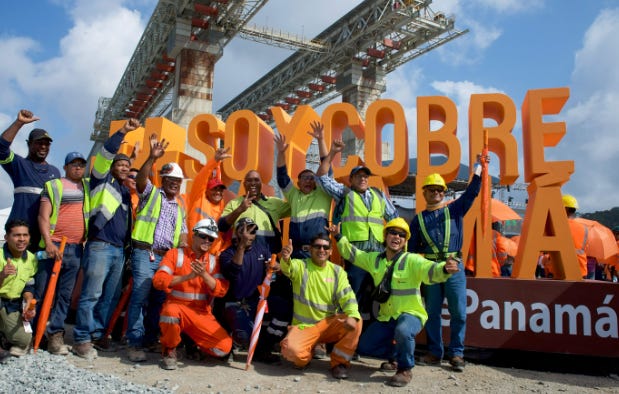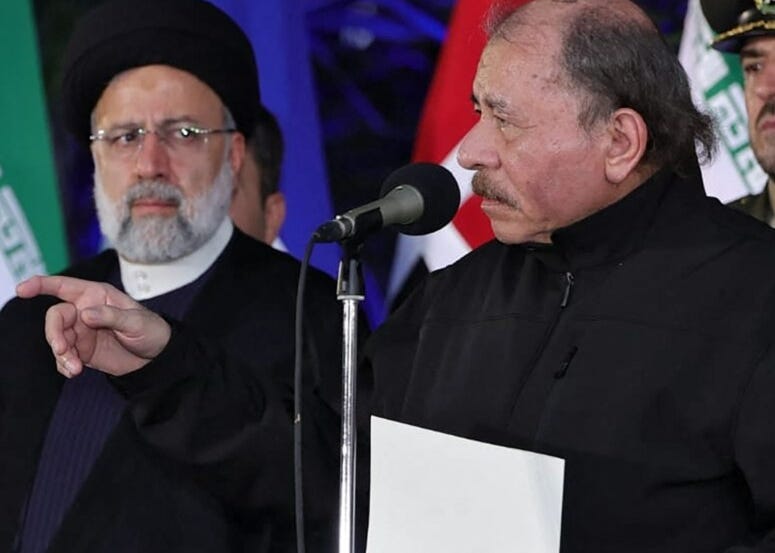Nicaragua, sanctions and mining
While Panama's First Quantum shutdown makes headlines, socialist Nicaragua appears to be a beacon of stability
In 2023, gold miner First Quantum announced they were shutting down Panama operations following a Supreme Court ruling nullifying their lease. The about face shocked the mining sector, as Panama had been viewed as a business-friendly country, ranked 35 in the Fraser Institute Economic Freedom survey.
Nicaragua on the other hand is ranked 95 and is ruled by the far-left Sandinistas who face US sanctions. Mining continues unabated, with foreign-mined gold constituting the country’s largest export. What does this apparent contradiction say about mining in a leftist country; and should foreign companies in Nicaragua be worried?
Sandinistas Part II
In 2006 the Daniel Ortega won a sweeping election victory in Nicaragua, marking a return of the leftist Sandinistas. The first time they saw power was in 1984, which led the Reagan administration to back rightwing rebels against the Sandinistas.
This time around the Sandinistas’ populist overtones haven’t translated into a business unfriendly environment. Canada’s B2 Gold took over the El Limon and La Libertad mines in 2009 after the financial collapse of Central Sun Mining. The mine appears to have operated successfully in the ensuing 10 years, and in 2019 the Canadian company Calibre Mining bought the assets for $100 million. Far from washing its hands of Nicaragua, B2Gold continued to have a 31% stake in Calibre.
Calibre put the mines into production in 2020, and the company now ranks as Nicaragua’s top gold producer. Ninety-five percent of Calibre’s 3,500 workers are Nicaraguan locals, most of whom are unionised and under two-year collective bargaining agreements, according to company materials.
Although Calibre is a mid-tier producer by industry standards, in little Nicaragua it’s one of the country’s largest exporters. Calibre was responsible for 35% of the gold exported from Nicaragua in 2022 (180,490 oz of 511,182 oz) and gold is Nicaragua’s largest export product, according to company figures.
The good old days: First Quantum before the shutdown (Photo from First Quantum).
Politics
While Calibre’s operations appear to be smooth, the Sandinista government has come under pressure from domestic opposition, and it’s rule has become increasingly authoritarian. In 2018 street protests erupted against Ortega’s welfare reforms lead to violent crackdowns that claimed some hundreds of lives, said Human Rights Watch.
In 2018 US slapped sanctions against the Sandinistas that acted to “restrict international financial institutions, including those affiliated with the World Bank Group and the Inter-American Development Bank, from extending financial or technical assistance to Nicaragua's government,” according to a US Congress statement.
Oretga’s 2023 visit to Iran. Photo Courtesy of AFP.
US sanctions
One of my specialties when I was with PwC was sanctions cases in Myanmar. My impression on the sanctions targeting Nicaragua is that they are fairly moderate and could have a subdued impact on foreign companies operating there.
The sanctions on Nicaragua are commonly called List Sanctions, which prohibit business with specific individuals or government entities. These contrast with sanctions being imposed on Iran that bar most business with the country.
The most US relevant sanctions orders for foreign miners in Nicaragua are Executive Order (E.O.) that amends E.O. 13851 signed 22 Oct 2022, as well as a Treasury Dept release on 17 June 2022 targeting the state mining company.
The 22 Oct order begins by criticising Ortega’s “sham” election is 2021 and his crackdown on opponents. Human rights abuses are noted, but the timing of the sanctions coincides with the Russia invasion of Ukraine, as detailed later on in the order:
“The Ortega-Murillo regime has increased its cooperation with Moscow by authorizing the continued presence of Russian military personnel and equipment in the country. The regime was … the only country in Latin America — to vote with Russia against an October 2022 UN General Assembly resolution condemning its attempted illegal annexation of parts of Ukraine.”
The Treasury Department release on 17 June zeroes in on mining:
“Prohibitions include the making of any contribution or provision of funds, goods, or services by, to, or for the benefit of any blocked person and the receipt of any contribution or provision of funds, goods, or services from any such person.”
It names the Ministry of Mines and Energy and its head Ruy Delgado Lopez as a blocked person (Canada also adopted sanctions in June 2019, but exempts companies with existing agreements).
Calibre’s shares fell over 25% after the sanctions news and the company issued a statement on 25 October saying it was reviewing the sanctions. Two days later, the company released a cryptic and non-sequitur press release saying it “confirms that the Sanctions do not have a material impact on its Nicaraguan operations.[sic].” No additional details were provided.
My take on the sanctions:
1) They don’t apply to non-Americans.
The sanctions ban Americans from doing business with the Ministry of Mines and Energy (ENIMNAS) without prior approval from the Treasury Department. For Americans working for Calibre, this could be reason to keep your name off of internal emails related to ENIMNAS. For non-Americans the 17 June order says: “foreign persons do not risk sanctions for engaging in activities authorized by GL 3.”
This passage is critical and it differs from many of the sanctions against other countries, which are extraterritorial and can impact a foreign company with US operations.
(2) Enforcement of sanctions is discretionary
US sanctions are often enforced for political reasons, meaning the US does not pro-actively seek out cases to prosecute solely because the sanctions are on its books. For example, between 2000 and 2017 the US and EU imposed multiple rounds of sanctions against Myanmar, restricting business with almost all of its elite and major conglomerates. To my knowledge, there was not a single prosecution in either the US or Europe related to sanctions infractions.
Iran sanctions on the other hand have seen some large cases, such as the 2015 $8.9 billion fine against BNP. Even with Iran sanctions, the enforcement is chequered, such as since October when the US has been looking the other way to Iranian oil exports following the Gaza attacks.
With this in mind, the question of whether Nicaragua mining companies will fall afoul of the US government depends on political considerations, rather than a literal interpretation.
(4) Nicaragua is not a priority
Despite the declining relations with the US, undermining the Nicaraguan government isn’t a priority for the US. The US does not consider Nicaragua a threat and appears to be maintaining a ‘don’t ask, don’t tell’ approach of maintaining sanctions on its books, but not looking to closely into compliance. This allows the US the keep the sanctions hanging over the Sandinista government, while not pushing them too hard into the Russian orbit.
Socialism and mining
There is a truism in the mining sector that right wing governments are good for mining and left wing governments are bad because they over tax, over regulate and even nationalise.
While there are many cases of leftie governments pursuing mining-unfriendly policies, Nicaragua does not appear to fit the mold. In 2022 PwC released its Doing Business in Nicaragua report that describes the country as being investor friendly. As someone who has done business in Asia, I can say that Nicaragua’s rules related to foreign property ownership, operating without a JV partner and use of foreign currencies is more liberal than places like Thailand, Indonesia and Vietnam.
The Sandinista government appears to view that chasing out foreign companies would result in mass layoffs, and cut the country off from much-needed revenue. Nicaragua’s credit rating would sink, cutting it off from capital. In 1984 during the Cold War, this was less important because alternative trade agreements and financing arrangements were available from the Soviet countries. Nowadays, the fallback of socialist financing is mostly off the table, forcing leftwing countries to refrain from drastic action against miners.
Nicaragua’s stability compared to the turmoil in ‘business friendly’ further discredits the ‘left wing-equals bad’ mantra. Left wing governments can be more stable than rightwing ones if supported by the low and middle classes, which make up the vast majority of most developing countries’ populations. Right wing governments supported by the business elite may represent just a fraction of the population, which leads to protests, road blockages and civil disobedience at the local level.
Will Nicaragua stay a benign place for mining companies? That depends on how it manages its international affairs. With the Ukraine war winding down and Taiwan de-escalating in the near term, there is a chance that China and Russia try to ‘stir up trouble’ in frontier countries like Nicaragua. If the Sandinistas fall too closely into the non-US orbit, we can expect the Americans to take a harder line against Nicaragua.





